Key takeaways:
- Community fisheries promote sustainable fishing practices and strengthen local cultures by fostering cooperation among fishermen and sharing knowledge across generations.
- Ocean conservation is vital for biodiversity, climate regulation, and local economies, emphasizing the need to prioritize healthy marine ecosystems.
- Engagement with local fisheries can be achieved through visiting markets, volunteering, and attending events, which enhances community bonds and supports sustainable practices.
- Sharing knowledge and resources within fishing communities through workshops and tool libraries cultivates innovation and strengthens communal ties.
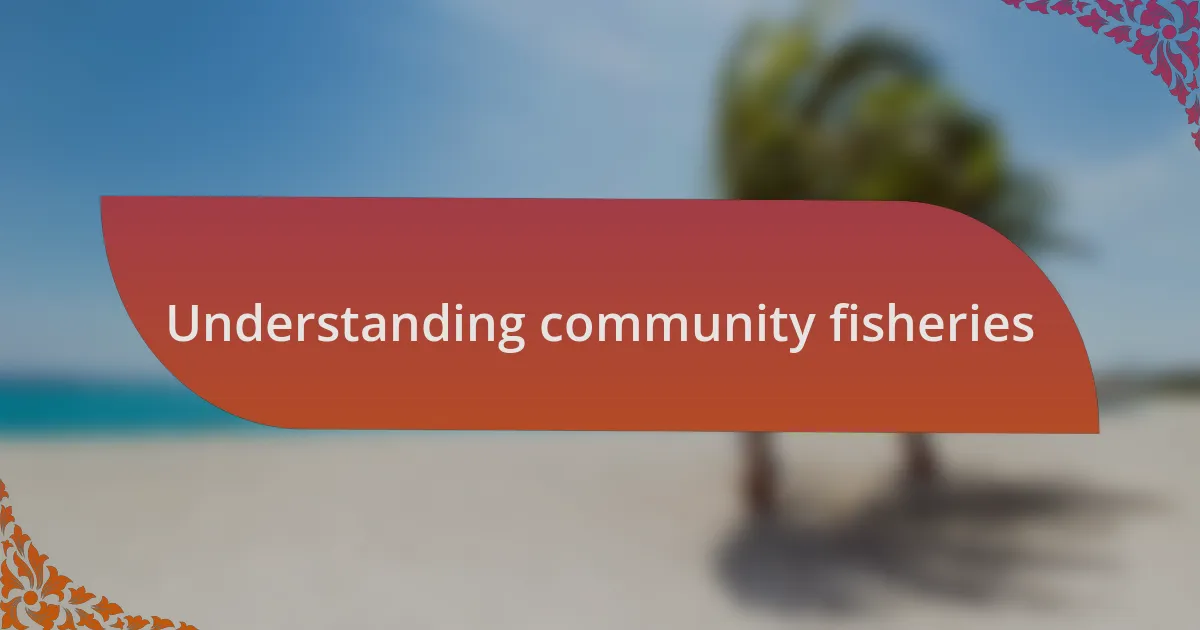
Understanding community fisheries
Community fisheries are more than just a source of fish; they represent the heartbeat of coastal cultures, embodying centuries of tradition and sustainable practices. I remember visiting a small fishing village where the community came together each evening not just to fish, but to share stories and pass down knowledge. Can you imagine the sense of belonging and continuity that fosters in both young and old?
These fisheries operate under the principle that local communities are best suited to manage their resources, often leading to more sustainable practices than large-scale commercial fishing. During a recent trip to a rural fishing area, I saw firsthand how families worked collectively, monitoring fish populations and making decisions based on what they observed. Isn’t it fascinating how this cooperative approach can ensure the balance between human needs and ocean health?
What I find particularly compelling is the resilience these community fisheries offer against external pressures like climate change and overfishing. In talking with local fishers, they shared stories of adapting their methods as species changed migratory patterns. How incredible is it that their intimate connection with the ocean enables this adaptability? It’s a testament to the power of community in preserving not only their livelihoods but also the fragile ecosystems they depend on.
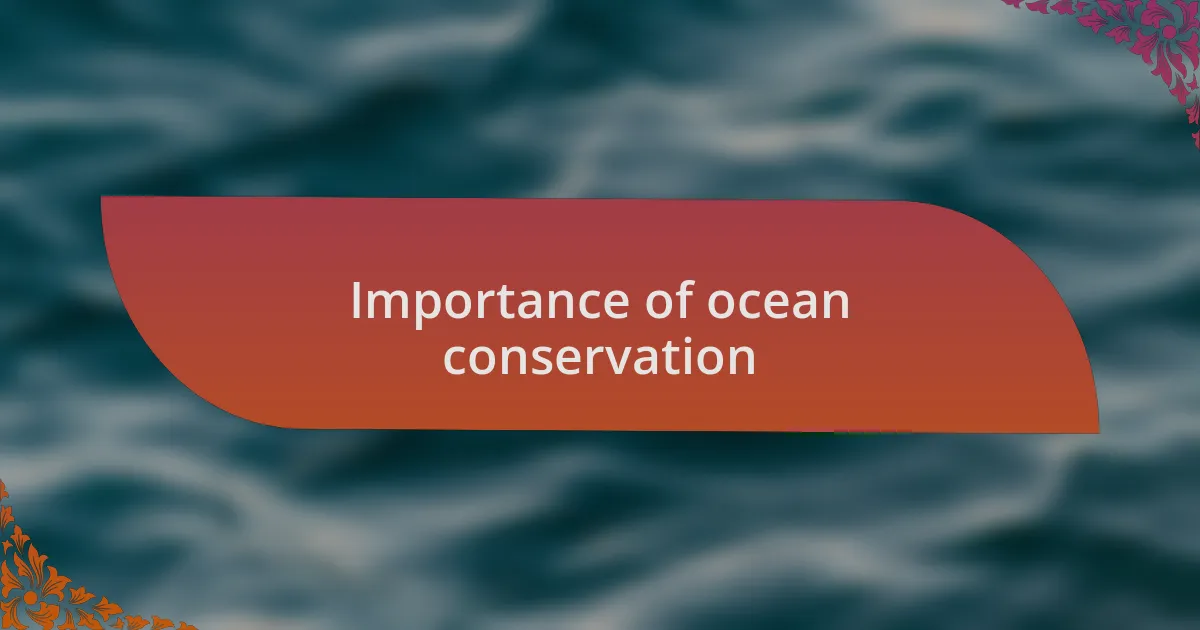
Importance of ocean conservation
Ocean conservation is crucial for maintaining the health of our planet. The ocean plays a vital role in regulating climate and supporting an array of life forms. The last time I stood on a beach, watching the waves crash and feeling that cool breeze, it hit me just how integral the ocean is to our everyday lives. This vast body of water not only provides food but also helps absorb carbon dioxide, making its conservation essential in our fight against climate change.
Moreover, healthy oceans contribute to biodiversity. Just think about all the marine species that depend on flourishing ecosystems like coral reefs and seagrass beds. I vividly remember snorkeling in a reef teeming with vibrant life. It was mesmerizing, yet it struck me how fragile that beauty is. When we protect our oceans, we’re essentially safeguarding the intricate web of life that not only enriches our world but also sustains human populations.
Lastly, the economic benefits of ocean conservation cannot be overstated. Healthy oceans support fisheries, tourism, and many coastal jobs. Reflecting on a local seafood market bustling with people, I realized that every fish caught sustainably means a brighter future for both the local economy and the ecosystem. So, why wouldn’t we invest in preserving such invaluable resources? The relationship we have with our oceans is symbiotic; nurturing it ensures both our survival and the vitality of marine life.
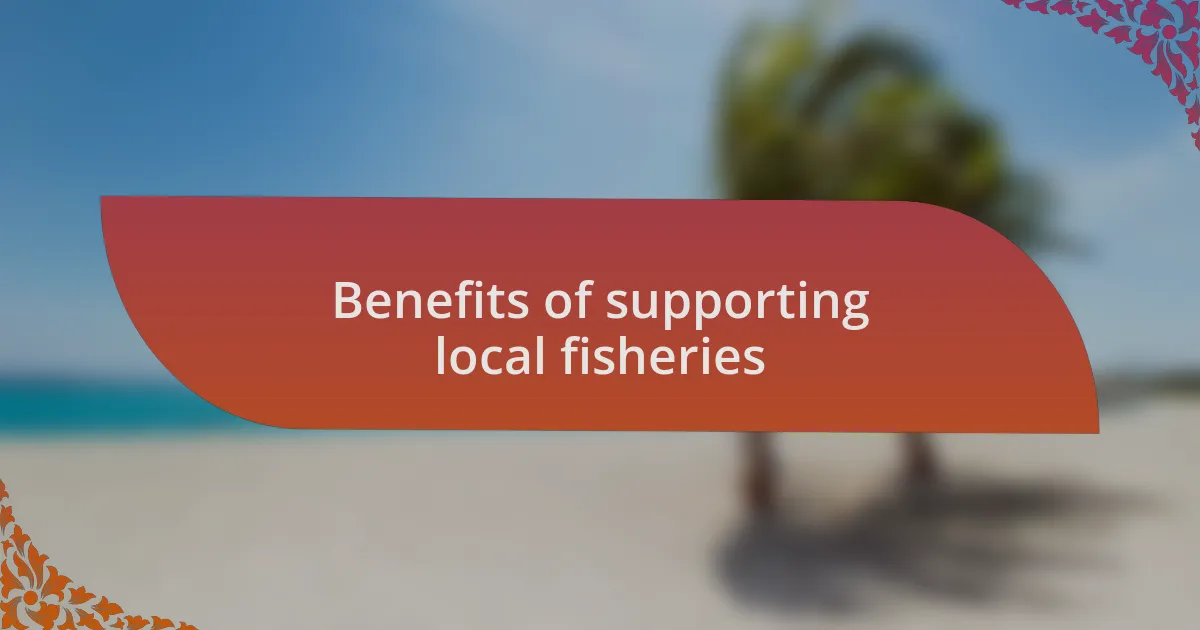
Benefits of supporting local fisheries
Supporting local fisheries goes beyond simply enjoying fresh seafood; it strengthens community bonds and local economies. I’ve visited fishing towns where families gather to share stories over their daily catch, building connections that nurture cultural heritage and foster a sense of belonging. Isn’t it heartening to think that when we buy from local fishermen, we’re not just purchasing fish but also supporting the community’s identity?
In addition to cultural impacts, local fisheries often employ sustainable practices that promote ecological balance. I personally recall attending a workshop where fishermen shared their experiences adapting to environmentally friendly methods. It was inspiring to see their dedication to preserving fish populations for future generations. This commitment not only maintains the health of our oceans but also ensures that we can continue to enjoy seafood without compromising the ecosystem.
Finally, by supporting local fisheries, we contribute to food security in our communities. I remember a time when a seafood co-op provided fresh fish for my neighborhood, ensuring everyone had access to nutritious meals. It was comforting to see neighbors come together, making meals a shared experience rather than just a chore. When we prioritize local sources, we create a more resilient food system that can adapt to environmental changes while keeping our communities nourished and thriving.
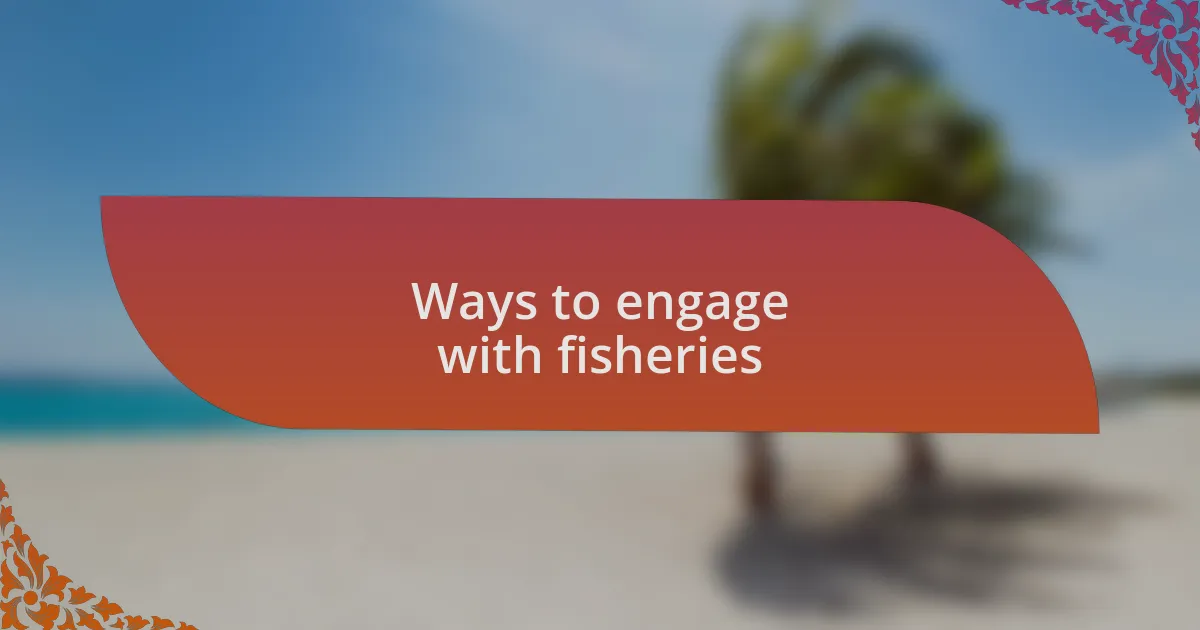
Ways to engage with fisheries
Engaging with local fisheries can start with something as simple as visiting a farmer’s market. I vividly remember my first trip to one near the coast; the vibrant stalls filled with freshly caught fish were a feast for the senses. It felt rewarding to chat with the fishermen about their catches and the sustainable practices they uphold. Have you ever thought about how conversations like these not only enrich our knowledge but also foster direct relationships with those who depend on the sea?
Another meaningful way to engage is through volunteering for local fishery support groups. I was fortunate enough to participate in a beach cleanup organized by a local fishing community. Working alongside fishermen and volunteers, I felt a profound sense of unity and purpose, knowing that we were collectively contributing to the health of marine ecosystems. It was a powerful reminder that every small effort counts, and it’s incredible how volunteering can deepen your appreciation for the hard work that goes into sustaining our ocean resources.
Moreover, I highly recommend attending local fishing festivals or events. I still cherish the memories from an annual fish fry where I met families who have fished the same waters for generations. The celebration not only highlighted local catches but also showcased traditional recipes, creating an atmosphere rich with shared heritage. Doesn’t it make you think how these events not only bring people together but also educate communities about the importance of sustaining our fisheries? Engaging with fisheries can be an opportunity to celebrate, support, and learn all at once.
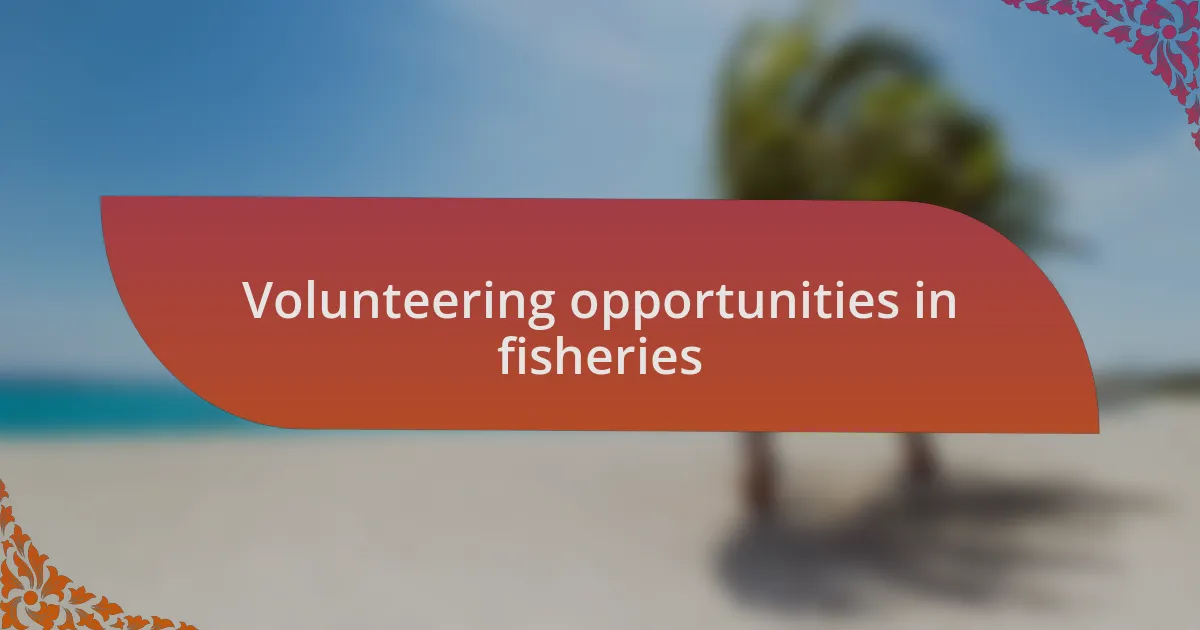
Volunteering opportunities in fisheries
Volunteering in fisheries can take many forms, and one of the most impactful ways I’ve found is assisting with local fish tagging programs. I recall my first experience where we collected data to help monitor fish populations. It was thrilling to feel directly involved in scientific research aimed at conservation, and I left with a sense of accomplishment knowing we were contributing to sustainable practices that would help ensure fish populations thrive for future generations. Have you ever considered how rewarding it could be to see tangible results from your efforts?
Another opportunity I discovered is helping out at local hatcheries, where I learned about the breeding processes that support our fisheries. The day I spent nurturing tiny fish embryos was unforgettable; it was like being part of a delicate miracle of nature. Watching them grow and eventually get released back into the ocean was a poignant reminder of our responsibility to protect marine life. Isn’t it fascinating to think that direct involvement not only aids the ecosystem but also cultivates a connection to the creatures we often take for granted?
Lastly, participating in community-supported fisheries (CSFs) has been an enriching experience for me. By volunteering to help distribute fresh catches to local customers, I gained insight into how important these networks are for supporting sustainable fishing practices. Each interaction with customers brought a sense of community, as we shared stories about the origin of the fish on their plates. Have you thought about how these small initiatives can influence local economies while promoting sustainable choices? The realization was eye-opening for me, reinforcing the impact of my involvement in the fisheries community.
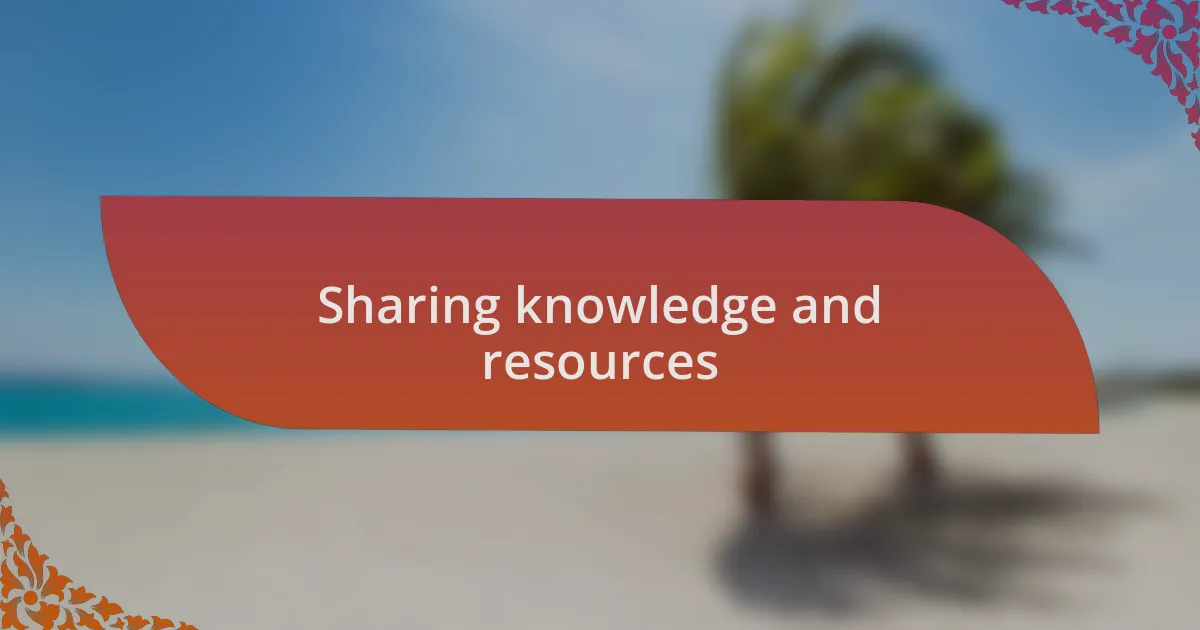
Sharing knowledge and resources
When it comes to sharing knowledge and resources in community fisheries, I’ve often found that workshops can be incredibly effective. Recently, I attended a local seminar focused on sustainable fishing techniques. The enthusiasm in the room was contagious as we exchanged tips on best practices—from using eco-friendly gear to understanding the life cycles of fish species. Have you ever left a meeting feeling energized and inspired to adopt new methods? That day, I realized knowledge sharing sparks innovation that can profoundly impact our fishing communities.
I also appreciate how my local fishing group actively shares scientific research with its members. In one memorable instance, we received a comprehensive report on the health of our coastal ecosystems. It inspired many members to implement more sustainable practices in their fishing methods. Isn’t it powerful to think that one document can shape the actions of an entire community? This shared knowledge not only builds trust but also fosters a collective responsibility toward conservation efforts.
Additionally, resource sharing can take the form of community tool libraries, where individuals can borrow gear for various fishing activities. I remember the first time I borrowed specialized equipment that I couldn’t normally afford. It was a game changer, allowing me to explore new fishing techniques I hadn’t considered before. Have you felt that sense of growth when trying something new? Being part of a community that prioritizes sharing not only enhances individual skills but also strengthens the bond among members, creating a supportive and collaborative environment.
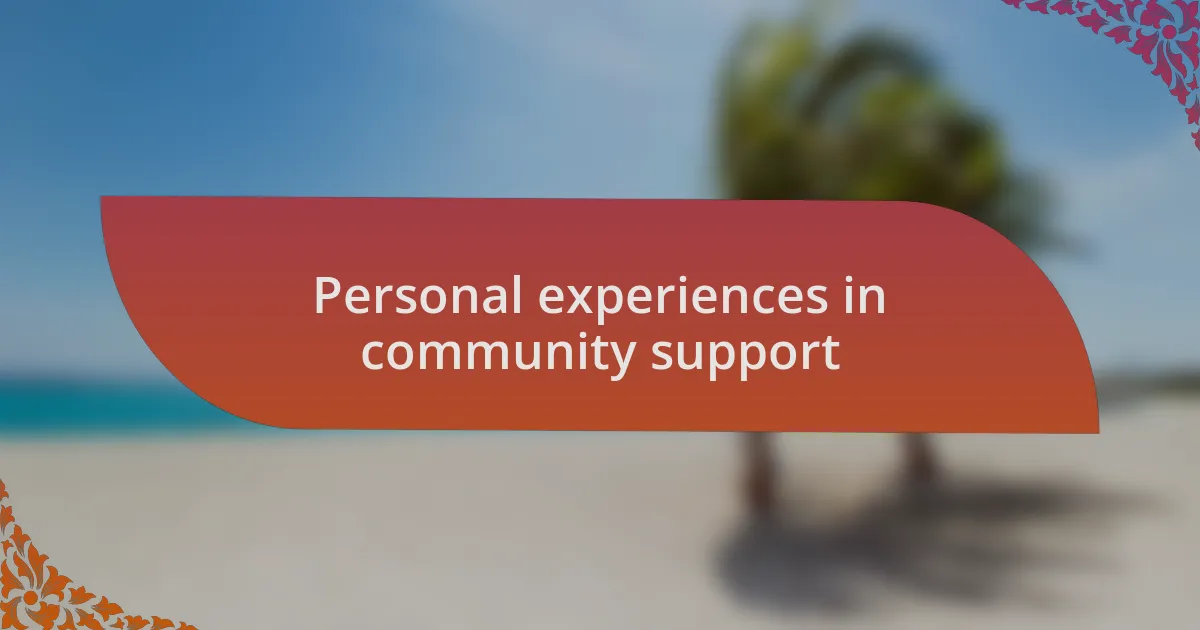
Personal experiences in community support
One of my most rewarding experiences in supporting community fisheries happened during a beach cleanup organized by our local fishing club. While picking up trash, I met a fellow fisher who shared her struggles with declining fish populations. It was heart-wrenching to see someone so passionate about her livelihood feeling disheartened. Have you ever connected with someone over a shared concern? That moment reminded me that our challenges unite us, motivating me to help amplify her voice in advocating for better local policies.
I also vividly remember my first community fishing event, where seasoned fishers patiently mentored newcomers. Watching them teach knot tying and casting techniques sparked a realization: the joy of fishing isn’t just in the catch but in the connections we build. I still smile when I think about how the laughter and stories shared that day created lasting friendships. Have you thought about how mentorship can transform not just skills, but lives? It reassured me that supporting community fisheries goes beyond technical guidance; it cultivates a tight-knit family bound by a love for the ocean.
In another experience, I volunteered at a local fish market where I helped foster interactions between consumers and fishers. The engagement opened my eyes to the importance of supporting local economies while promoting sustainable practices. Listening to direct feedback from customers reinforced the value of transparency in sourcing fish. It made me wonder, how often do we think about the journey our food takes to reach us? This experience taught me that community support is about creating a web of relationships built on trust, education, and shared interests in preserving our marine environments.